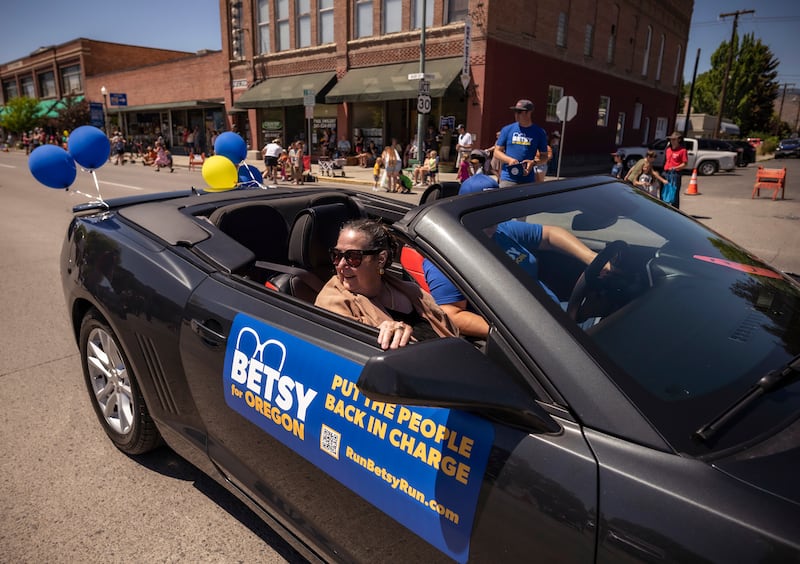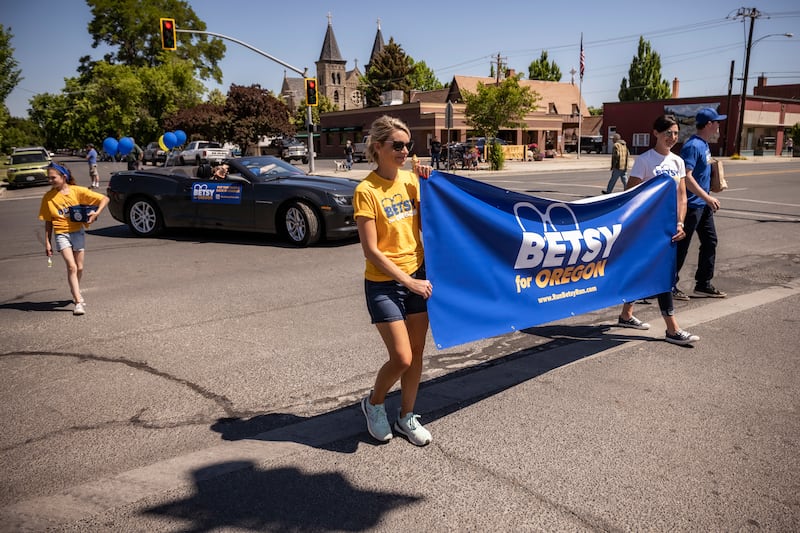Betsy Johnson needed help in her quest to become governor. She went to the Tillamook County Fair earlier this month to get it.
Most years, the fair’s biggest draw is the Pig-N-Ford races. Drivers pilot Model T’s around a dirt track while clutching 20-pound piglets on their laps.
This year, Johnson was the main event. At a booth set up on the eve of the deadline to submit the signatures she needed to qualify for the ballot as an unaffiliated candidate, she asked fairgoers in person for their support.
For Paul and Becky Robison of Bay City, signing Johnson’s petition was personal.
In 2018, the Robisons ran into red tape trying to adopt a foster child. They contacted Johnson, then their state senator. Johnson called the director of the Oregon Department of Human Services. No more red tape.
“I reminded her what she had done for our family,” Becky Robison says. “I told her, ‘You made our family complete, and we will be forever indebted to you.’”
To supporters, that’s who Johnson is.
“I have never seen a legislator more committed to constituent service,” says state Sen. Lee Beyer (D-Springfield), who has served in Salem for 31 years and endorsed Johnson. “And she tends to think anybody who feels injured by the state, anywhere in the state, is her constituent.”
Johnson, 71, qualified for the ballot Aug. 26. She is seeking to become the second governor in Oregon history unaffiliated with any political party. (Only Julius Meier, who served from 1931 to 1935, did it before.)
Her allies hope Johnson’s granular understanding of government and her willingness to tell hard truths can overcome Oregon’s malaise.
She has been preparing for this opportunity all her life, attending endless community gatherings, donating millions of dollars from her family foundation and, most importantly, toiling for two decades on the Legislature’s budget-writing Joint Ways and Means Committee, the last three years as co-chair.
As a lawmaker, Johnson delivered: a historic irrigation project in Umatilla County; funding for the homeless services program at the former Wapato Jail in Portland; and a nonstop string of appropriations and projects for her district, including millions of dollars for a new school for flood-ravaged Vernonia and, most recently, the Oregon Manufacturing Innovation Center and Portland Community College’s job training center, both in Scappoose.
But what truly distinguishes her legislative career is how, unlike any lawmaker in the past 20 years, Johnson has ridden herd on state agencies that have displeased her, sometimes using the state’s checkbook as a cudgel.
“I have not seen a person in the legislative process who is as close a reader of agency budgets as Betsy,” says former Gov. Ted Kulongoski, who has endorsed Johnson.
Fellow lawmakers say she’s displayed an unusual willingness to prod and even bully state agencies to do her bidding. “She’s got half the bureaucracy on speed dial,” adds state Sen. Brian Boquist (I-Dallas), who’s endorsed Johnson. “She’s been down in the weeds, so she knows where the dirt is, and she’s not afraid to hold bureaucrats accountable.”
Johnson relishes the characterization. “I have defined the role of legislator as advocate,” she says. “And I certainly have not been shy about engaging with state agency people.”
Interviews with lawmakers, local elected officials, state agency staff, and constituents, and a review of thousands of pages of public records at regulatory agencies show two things: first, a genuine ability to get things done as a legislator and, second, a decadeslong pattern of aid to large corporations and wealthy individuals—often at the expense of the environment.
And while her environmental voting record is poor—the Oregon League of Conservation Voters scored her at 41% in 2021, lower than then-Senate Minority Leader Fred Girod (R-Stayton)—it’s her direct intervention in state agencies outside her work in the Senate that critics find more troubling.
“Her interest has always been to lighten the hand of government on businesses in terms of regulation and public health,” says state Sen. Michael Dembrow (D-Portland), former chair of the Energy and Environment Committee who’s endorsing Democrat Tina Kotek.
Maybe that’s because Johnson is a timber heiress struggling with Oregon’s transformation from an extraction- to a service-based economy. Or maybe she’s just more comfortable doing the bidding of the state’s powerful interests. Or it could be that her pugnacious, unapologetic attitude toward agencies is what the state needs.
Voters must now decide whether hers is an approach that benefits all Oregonians.

Betsy Johnson comes from a family that derived a handsome living from the land but also believed in public service.
Johnson grew up in Redmond, the center of her family’s logging and mill operations. In addition to running those businesses, her father, Sam Johnson, found time to serve 12 years in the Oregon House and later as mayor of Redmond.
Betsy Johnson’s mother, Becky, served on the Oregon State Board of Higher Education and numerous other boards. Johnson’s parents created a family foundation that now has assets of $17.5 million. (Johnson and her younger sister, Patricia, give away about $700,000 a year.)
Johnson came to Portland for high school, boarding at St. Helen’s Hall (now Oregon Episcopal School). Her leadership abilities were apparent even then; she was student council president.
She graduated from Carleton College in Minnesota in 1973 and came back to Oregon to work as a helicopter pilot. (Her father insisted both she and Patricia learn how to fly.) Johnson also attended law school at Lewis & Clark College at night, graduating in 1977.
“She was an ebullient person,” recalls Larry Wobbrock, a lawyer who was a classmate of hers in college. “A big personality who liked to joke around.”
In 1977, she started a helicopter company at the Scappoose Airport, eventually operating a fleet of choppers to, among other things, ferry scientists and media to the 1980 eruption of Mount St. Helens.
It wasn’t until 16 years later, at the age of 42, that Johnson officially entered politics, winning a seat on the Port of St. Helens Commission. Soon after, she went to work for—of all things—the state of Oregon, running the Oregon Department of Transportation’s Aeronautics Division. (Her husband, John Helm, took over the helicopter business, which shifted to fueling and providing charter services. The couple has no children.)
Johnson involved herself in a variety of local issues from the Scappoose Library Board to a long-running battle against CalPortland, a building materials company that wanted to mine gravel near the Scappoose Airport (Johnson won).
Pat Zimmerman, a former Intel manager who lived in Scappoose, teamed with Johnson on some Columbia County issues and litigated against her on others.
They first met about 25 years ago when Scappoose needed a new public library. “She suggested we divide the Scappoose phone book into five and call every single person,” Zimmerman recalls. “We got the library.”
“Betsy is the hardest worker I have ever seen,” she adds.
Len Waggoner, a developer, recalls hitting roadblocks when he tried to develop a Fred Meyer in Scappoose in the mid-1990s.
He struggled to convince midlevel company management the project was viable. And ODOT balked at allowing frontage access from Highway 30.
Johnson made two calls: to the highway department and Freddy’s CEO Bob Miller. “She took on ODOT—that was impressive,” Waggoner says. “And with Miller, she had access I just didn’t have.” The store opened and remains a vital asset to Scappoose.
In 2000, Johnson ran for an open seat in the Oregon House vacated by state Rep. Jackie Taylor (D-Astoria). She ran as a Democrat but also won the GOP nomination. And in 2005, when her predecessor, Sen. Joan Dukes (D-Astoria), stepped down, Johnson moved up to the Senate.

For 20 years, Johnson represented a conservative, rural district but lived just 30 minutes from Portland. She bridged the gap between two Oregons.
Johnson is as comfortable eating deep-fried cheese curds at the Tillamook County Fair as she is nibbling truffled goat cheese at the Arlington Club. “She’s absolutely the queen of the region,” says former Scappoose City Councilor Joel Haugen, who often disagreed with her.
Johnson delivered for the constituents of a sprawling Senate district that stretched from Portland’s West Hills to Astoria and south to Tillamook.
“My job was to create jobs and opportunity for my district,” Johnson says. “And I did so ferociously and unapologetically.”
An example of her advocacy: the growth of Teevin Bros. Land & Timber, headquartered in Rainier.
Johnson pushed ODOT’s Connect Oregon program to award Teevin Bros. five separate capital improvement grants worth more than $9 million.
She acknowledges that her efforts as co-chair of Ways and Means benefited her district more than other regions of the state. Johnson says that’s because she put in the work.
“I did the butt time in the meetings. I knew the projects well and could be a ferocious advocate,” she adds. “I’ll leave it to other legislators to decide whether or not they thought that was in their job description.”
Unlike many lawmakers, Johnson kept an open line with agency directors, yanked them into her office when she thought it necessary, and dealt out legendary tongue-lashings in budget hearings.
“She was tough on agency directors,” Beyer says. For many Oregon business leaders, Johnson’s hard-nosed approach presents hope. Perhaps that’s why Nike co-founder Phil Knight has already given her campaign $1.75 million.
“Her knowledge of the state bureaucracy and her relentless advocacy on behalf of concerned citizens are exactly the type of characteristics we need in a governor,” says Columbia Sportswear CEO Tim Boyle, whose late mother, Gert, was close to Johnson and who’s given her campaign $466,000.
As an example of Johnson’s fearlessness and ability to work the levers of government, supporters point to her role as the key “yes” vote for the 2019 Student Success Act, a $1 billion tax increase for K-12 education. Johnson conditioned her vote on cuts to public employee benefits, something nearly unimaginable in a Legislature controlled by Democrats.
“Betsy Johnson likes power,” says Doug Moore, executive director of the Oregon League of Conservation Voters. “And unlike most Oregon politicians, she knows how to use it.”

A Democrat until she resigned her Senate seat to run for governor, Johnson once served on the board of Planned Parenthood and is resolutely pro-choice. On other Democratic issues, she’s often been at odds with her party: Johnson was the only Senate Democrat to vote against a historic 2016 minimum wage hike and regularly voted against gun control measures.
But the environment was where Johnson’s deviations from her party brought her into conflict with agencies. She opposed almost every significant environmental bill during her tenure. Her most notable vote on the side of the environment—the 2009 Metolius River protections—benefited the nearly 160-acre property Johnson owns near the river.
The state Department of Environmental Quality was an object of particular scorn.
In a recent interview with WW, Johnson mimicked what she said was a typical call with the administrator of DEQ’s Northwest region, Nina DeConcini.
“I screwed one of your constituents back to the Stone Age,” Johnson imitated DeConcini saying in a high-pitched tone. “Good luck with them getting out of this hell. I’ll be off to Tuscany this month and will call later, bye-bye.”
Johnson adds that if she had been governor, she would have fired DeConcini and her boss, DEQ director Richard Whitman. (Whitman has announced he’ll retire at year’s end.)
“The Department of Environmental Quality has lost its way,” Johnson says, adding that agency staff are often “incompetent” and “biased.”
DEQ spokesman Harry Esteve says, “Sen. Johnson has had a strong interest in DEQ’s work and has engaged more frequently with DEQ than most lawmakers.” As for whether Johnson ever came to the agency seeking tougher regulation, Esteve says, “Not that we recall.”

Johnson often crossed swords with DEQ and the Department of State Lands, which manages 775,000 acres and oversees state waters and wetlands.
In August 2021, DSL records show, Johnson became “incensed” after somebody filled in a wetlands on Sauvie Island, the emerald of her district.
Johnson directed her ire not at the property owner who filled the wetlands, but at the agency that tried to enforce the law to reverse the damage.
The conflict began in late 2017, when Peter Stott, a prominent Portland businessman, bought a 27-acre hobby farm on Sauvie Island.
Stott, who made fortunes in trucking, timber and Portland real estate, cut down what neighbors in written complaints called dozens of “significant” trees. He also, without the required permits, filled in an 11.57-acre wetlands.
DSL investigated and determined Stott had broken state law by filling his property, which is near the Sauvie Island Wildlife Area. The agency told him he needed to restore it. Records show DSL found Stott slow to comply. He soon contacted Johnson for help.
“I reached out to Betsy because she was a longtime friend and was also my state senator,” Stott says. “My goal was to comply with the requirements of the DSL consent order, but the process had stalled.”
Johnson took up his cause. Records show she met with DSL director Vicki Walker in her office and with Walker’s deputy at Stott’s property.
The upshot? DSL allowed Stott to restore less wetlands than he improperly filled; regrade the property without a permit; and plant corn when the wetlands dried out each summer. Moreover, DSL did not seriously sanction Stott for what the agency said was repeated noncompliance with the consent agreement he had signed. Stott paid a $3,000 fine.
“In my mind, Betsy got DSL to do its job,” he says.
Walker, who served with Johnson in the Senate, says Johnson’s intervention made a difference.
“She was a tireless advocate on behalf of Mr. Stott, and that likely led to a better outcome for him,” Walker says. “Sen. Johnson is more involved with agencies than other legislators, and that goes back a long way.”
In November, Stott contributed $100,000 to Johnson’s campaign. She bristled at questions about the contribution.
“If you’re suggesting a quid pro quo—that he bought his solution for a hundred grand—you’re full of shit,” she tells WW.
Stott agrees. “I didn’t need to contribute to Betsy’s campaign,” he says. “I wanted to contribute to her campaign because I am convinced she is the best candidate to get Oregon back on track.”

For 25 years, Johnson has been the champion of an effort to expand the state-owned Aurora airport in rural Marion County (nowhere near her district) in the face of environmental protections and land use laws.
Her vision? A proposal by long-term Johnson allies to develop a massive complex of offices and hangars on greenspace adjacent to the airport—and 1,000 more feet of runway so more and larger private jets can land.
Aurora State Airport lies adjacent to a 117,000-acre swath of prime Willamette Valley farmland called French Prairie.
The ground is flat, well irrigated and blessed with a thick blanket of fertile topsoil. It was French Prairie that prompted Gov. Tom McCall to champion Oregon’s pioneering protections for forest and farmlands.
“French Prairie is the Eden at the end of the Oregon Trail,” Jim Johnson, an Oregon Department of Agriculture land use specialist, once told The Oregonian. “It’s the heart of Oregon agriculture.”
Last year, when the Oregon Court of Appeals rejected Aurora’s latest expansion plan, Johnson railed against the court, calling the decision a “horrible precedent.” She warned the Oregon State Aviation Board in a public meeting that if it failed to appeal the decision to the state Supreme Court, it would “represent a complete abrogation of your responsibilities and a breach of your fiduciary duty to Oregonians.”
Wilsonville City Councilor Charlotte Lehan says Johnson’s efforts to promote urban-style development on rural land came at the expense of the public.
Lehan and other critics fear Johnson’s vision for the airport could lead to unfettered sprawl from Wilsonville to Keizer.
“Everything she actually does is aimed at undermining the land use system for the benefit of land speculators,” she says.
Johnson says her detractors overstate the risks and underestimate the benefits. “I want to see the airport grow and develop,” she says. “I want to see that investment.”
Legislation Johnson sponsored in Salem and her advocacy at the federal level “has piled about $250 million worth of private investment into that airport,” she says. “It has provided a home for Life Flight and a lot of corporations that have airplanes domiciled there.”
Ben Williams, a retired health care executive who leads Friends of French Prairie, notes that corporations and individuals who use the Aurora airport or have investments there have contributed more than $300,000 to Johnson’s campaign.
“She’s a very intelligent and capable person,” Williams says. “She is also a study in crony capitalism.”

In August 2019, Johnson inserted herself in the environmental regulatory process after the death of more than 30,000 coho salmon, steelhead and cutthroat trout—fish protected by the federal Endangered Species Act.
The fish perished at privately owned, 80-acre Fishhawk Lake, a body of water halfway between Portland and the coast in Johnson’s Senate district.
Numerous state and federal agencies investigated because of the Endangered Species Act and determined that the fish kill occurred when the Fishhawk Lake homeowners association illegally drained the lake to release silt that was filling it.
That sucked the fish through a drain under the dam and left some trapped on the exposed lake bottom. Silt and thousands of dead fish flowed into Fishhawk Creek, a tributary of the Nehalem River and a prime fish habitat.
Within two weeks, Johnson intervened on behalf of the homeowners association with numerous state agencies, including DEQ.
Jane Hickman, a retired, longtime DEQ legal enforcement official, found Johnson’s intervention inappropriate but typical for the senator.
“She was dealing with people high up at DEQ,” Hickman says. “Everybody dropped what they were doing when she called.”
Johnson says she got involved to counterbalance overzealous regulators, describing her role as “a ferocious champion for a community that was getting screwed.”
The homeowners association ended up paying DEQ a $439,000 fine, and insurers paid the Oregon Department of Fish & Wildlife another $3.7 million. In addition, Columbia County prosecutors won criminal convictions, rare in Oregon environmental cases, against the two men responsible for draining the lake.
Hickman says the homeowners got special treatment when Johnson intervened with numerous agencies at the same time.
“The fact that she interceded on behalf of a respondent and was trying to get everybody to back down was bad,” Hickman says. “When you are in enforcement, everything is supposed to be equal—the same for everybody,”

Johnson says the model for her candidacy is the late Gov. Tom McCall, whose legacies include the Bottle Bill, making Oregon’s coastline public, and creating the state’s land use system.
“He ran as a Republican, but with that same independent spirit Oregonians are proud of,” Johnson says.
Each of McCall’s legacies favored the broader public over the narrower interests of a few. Critics say Johnson often does the reverse.
Johnson rejects such criticism. She says the dairymen, fishermen, loggers and farmers in her district got just as much or more of her attention than corporate chiefs or wealthy friends. Her interest, she adds, was the same no matter who called: common-sense solutions that balanced the need for reasonable regulation with Oregonians’ desire to live happy, prosperous lives.
“Oregon is broken,” Johnson says, “and I believe that I’m the instrument to help fix it because I’m not beholden to the unions. And I’m not beholden to a bunch of special interest guys.”
Rachel Monahan contributed reporting to this story.

Real Estate Deals
Betsy Johnson was widely reported to be considering the open 2010 governor’s race back in 2007, but that opportunity fizzled in 2008 after she admitted violating Oregon ethics law. She paid a $600 fine and apologized for what she said was an inadvertent mistake.
At issue: a 2004 real estate transaction near the Scappoose Airport she failed to disclose in her annual filings of economic interest. As WW reported then (“Dirt, Cheap,” June 26, 2007), Johnson bought 36.24 acres of land adjacent to the airport from a farmer, Stan Wagner, and soon resold it to developer Ed Freeman at a profit of approximately $50,000.
In 2006, Johnson “brokered” for no charge a second transaction in which Wagner sold 232 acres to Freeman for $2.39 million, a little more than $10,000 an acre.
The purpose of both transactions was the same, Johnson said: to consolidate land for industrial development adjacent to the Scappoose Airport.
“I created a vision of opportunity and benefit for Columbia County, for Oregon,” Johnson says. “I sold that vision doggedly.”
Today, the land around the airport (where her family business, Transwestern Aviation, is located) has been annexed by the city of Scappoose and brought inside the urban growth boundary. Freeman enlisted Portland investor Joe Weston to help him build out the Columbia Commerce Center industrial park.
Cascades Tissue Group, a toilet paper manufacturer, bought 50 acres in the park for $142,000 an acre in 2016.
Transactions since then involve organizations leveraging state money. In 2017, the Oregon Manufacturing Innovation Center, part of the Oregon Institute of Technology, paid about $175,000 an acre for a parcel of land near the airport. Johnson secured $14 million for the project from the Legislature.
In 2019, Portland Community College, after much lobbying by Johnson, paid $226,000 an acre for 17 acres adjacent to the airport to build a job training center. NJ.

Who’s With Her?
It’s been well documented that some of Oregon’s wealthiest individuals, including Phil Knight, Tim Boyle and Jordan Schnitzer, are among Betsy Johnson’s largest supporters.
What’s gotten less attention is that many of the state’s largest corporations—particularly those engaged in extractive industries such as logging, mining, petroleum and fishing—also back her.
Here’s a list of some of those contributors:
Forest Products: $1.06 million, led by Sierra Pacific Resources ($200,000) and Hampton Lumber ($150,000)
Mining/Excavation: $1.05 million, led by Papé Group ($750,000) and CalPortland ($150,000)
Fishing: $290,000 from Pacific Seafood and affiliates
Petroleum: $160,000 from Global Partners
Johnson says her contributors are simply making an investment in the state’s future.
“They have an interest in saving the state they love,” she says. “They have chosen a third path that has not been offered to them here so far.” NJ.
